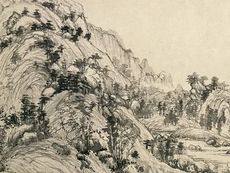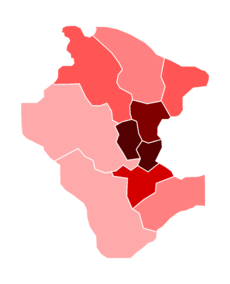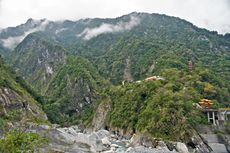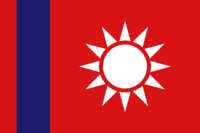Huachang
Huachang 花场州 Huāchǎng zhōu | |
|---|---|
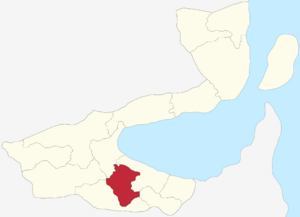 Map of Monsilva with Huachang highlighted | |
| Country | |
| State status | 1 July 1984 |
| Capital | Chishang (池上) |
| Government | |
| • Body | Huachang State Government |
| • Premier | Wang He (FDP) |
| • Deputy Premier | Yu Zhi (FDP) |
| Population (July 2022) | |
| • Total | 1,947,635 |
| Time zone | AMT+13 (Monsilvan Eastern Time, MET) |
| ISO 3166 code | MS-HUA |
| GRP (¥) | ¥373 billion |
| Major airports | Chishang City Airport (CCA) |
| Transit System(s) | MRA Chishang Metro (Chishang only) |
| Police[1] | Huachang State Police |
| Ambulance[2] | Huachang State Ambulance |
| Fire[3] | Huachang Fire Service |
Huachang (Monsilvan: 花场州; Pinyin: Huāchǎng zhōu), is a state of the Monsilvan Republic. The state has around 1.9 million people, with 86% of them living in the state's capital, Chishang. It is located in central Monsilva, sitting south of Bazhong and Amking, north of Nanyan and west of Zaixian. Huachang is very mountainous, and therefore has a somewhat cooler temperature than most of its surrounding regions. The state of Huachang is governed by the Huachang State Government, with Wang He of the Green Party being the current premier. The state is divided into 3 districts, 10 counties, 33 legislative constituencies and 42 municipalities and is equally represented by 3 Senators in the Senate and 33 members in the Legislative Assembly. The Huachang State Parliament consists of 42 seats, and is the only state to be lead by the Green Party. The Reformed National Party leads the opposition.
Huachang is Monsilva's 10th most populous state, and has the 8th highest urbanization of all the states. Huachang's industry is predominantly agricultural, with both tea and rice being grown in large amounts. In urban Huachang, the capital Chishang is the state's only city and has a large ceramics and pottery industry. The city is known for producing lots of intricately made stained glass windows and pots. Huachang has a nominal GRP of around ₵62 billion, giving it a GRP per capita of ₵31,785.
Huachang is connected by the Monsilvan Railways Administration, which provides services throughout the state. Chishang, as well as having the MRA, is also served by the Chishang Metro, although it is very small and only covers half of the city. Huachang has one major airport: Chishang City Airport. Huachang is well-known for its winding mountain roads that can occasionally be dangerous due to their proximity to steep cliffs.
Contents
Toponymy
The name, Huachang comes directly from the HY Pinyin of the Monsilvan "花場". Huachang is one of very few Monsilvan states that has a formally confirmed etymology. "花場" directly translates to "flower field". This was confirmed by a script found originating from the establishment of the Zhou dynasty referring to the central region of "Huachang" as "the beautiful flower fields in the center of our kingdom".
History
Prehistory and early dynasties
Huachang has been inhabited for thousands of years, but proper settlements can only be dated to around 2000 years ago. This is possibly due to the mountainous landscape made settling here pointless as access to the sea was limited. However, the mountains of Huachang have been a useful asset to civilizations settled in the nearby area as an advantage in warfare.
Huachang as it is today, was entirely under the authority of the Xia dynasty when it was established in 820 BCE. It was predominantly used as agricultural land for growing crops like rice and tea. Huachang had no major settlements and was only covered in many small farming towns for most of Monsilva's dynastic history. Huachang's mountains were often used as a barrier from invading dynasties trying to reach Amking.
Zhou dynasty and the Empire of Baltanla
When the Unification of the Monsilvan Kingdoms took place in 1201, Huachang remained a highly agricultural state, which lead to roads being built for horse-drawn carriages to take crops from the fields of Huachang, to the ports of Amking and Shangrao. The frequent trade brought more people to Huachang. Although, in the later years of the Zhou dyansty, the trade had begun to slow down. This would have caused lots of people living in Huachang to be struck with extreme poverty.
When the Zhou dynasty voluntarily ceded itself to the Empire of Baltanla, the country was hopeful that the empire would bring it prosperity. Fortunately, after a few years under the Empire, Huachang, along with the rest of the country began a slow but steady recovery. Huachang retained its status as an agricultural state under the empire, and continued to send its goods to the busy ports up north.
Kingdom of Great Shan and the Civil War
When Monsilva left the empire in 1730, Huachang was in much better shape than how it had entered. It retained its position in the country's economy throughout the Kingdom of Great Shan.
The Monsilvan Civil War arrived in 1824, but fortunately Huachang saw little conflict, as it began the war being fully occupied by the Liberate Monsilva Movement. The fighting only reached the borders of the region. However, the region was cut off from the cities on the coast which were occupied by the Imperial Army. So although Huachang saw little physical conflict, the war still brought famine and poverty to the region.
Kingdom of Monsilva and the Republic
After the war, Huachang's towns were in ruins from lack of maintenance. This was because half of the region's population had died from famine during the war. However, now that the war had ended, repairs began and the region began recovering economically and population grew again. During the Kingdom of Monsilva, Huachang was established as an government region, which encompassed all of modern-day Huachang as well as a large portion of modern-day western Amking.
When the Monsilvan Republic was established in 1978, not much changed to Huachang. Until 1984, which saw the region be established as a state in the federal system, having split of from the state of Huaking, which already had devolved power itself under the Huaking State Government. This lead to the establishment of the Huachang State Government, which was lead by the RNP from its establishment until the 2011 Huachang state election, when it was beaten by the FDP, which was then overtaken by the Green Party in 2017. The FDP did not move into opposition in 2017, despite having more seats than the current opposition, due to the party's coalition with the Green Party.
Administration
Local government
The state of Huachang is governed by the Huachang State Government, based in the Huachang State Office in Chishang. The state parliament is a unicameral legislature consisting of a 42-seat State Parliament. Each municipality in Huachang is represented by one State Parliament Member. Members are elected for four-year terms. The Parliament meets every week, with the day depending on the first weekday after the state election which takes place in different states at different times. The leading party in the State Parliament determines who will be the Premier. Wang He of the Green Party has been the Premier of Huachang since 2017.
National government
Huachang is represented in the Parliament of Monsilva by 3 Senators in the Senate of Monsilva and 33 Members of the Legislative Assembly.
Geography
Huachang is a very mountainous state, with two ranges straddling the state in the north and the south. In the middle are large valleys in which towns and the city of Chishang can be found. Huachang has good soil quality which has encouraged its large agricutural industry. It is also home to many national parks thanks to its untouched landscapes and forests. However, Huachang's mountains occasionally cause minor draughts which can affect agriculutre, but this has been countered in recent years by regulated greenhouses.
Climate
Huachang is a warm state, however on top of mountains the temperatures can sink very low, especially in the winter months. Its temperate climate has been a large reason for people moving to the state, as most of the nearby regions Monsilva are much hotter.
Demography
| Country of Birth | Population | Percent | |
|---|---|---|---|
| 1,805,458 | 92.7 | ||
| Non-Monsilvan | 142,177 | 7.3 | |
| 101,277 | 5.2 | ||
| 29,215 | 1.5 | ||
| Others | 11,686 | 0.6 | |
| Total | 1,947,635 | 100.0 | |
The 2022 census recorded that 142,177 people or 7.3% of Huachang's population were of non-Monsilvan descent. The table to the right shows the most common countries of origin of Huachang residents. Due to Huachang being less urban than many other states, it attracts fewer immigrants or internal migrants. 86% of Huachang's population lives in Chishang, which is also where the vast majority of Huachang's non-Monsilvan population lives. The other 272,669 people living outside of the cities are predominantly Monsilvan and live in towns scattered across Huachang's agricultural valleys or in its tea crop hills.
Religion
Huachang has a majority folk religion following. In the 2022 Census, following 'Monsilvan folk religion' at 75.3%; was 'Buddhism' with 14.8%; then 'Unaffiliated' (anyone who does not associate with a religion, including atheism and agnosticism) followed at 8.2%; then finally, the 'Other' category, which includes Christianity and Islam, consisted of the last 1.7%.
Throughout its history as a region as well as a state, Huachang has been predominantly associated with the folk religion, and the majority of its citizens have followed it for hundreds of years. However, when the Empire of Baltanla became the administering government in Huachang in the 16th century, Buddhism began to receive and increased following. Today, Buddhism is the second most followed religion in Huachang.
Transport
Huachang's transport is administered by the state's Department for Transport, which is a sub-department of the federal Department of Transport. Huachang is one of Monsilva's more accessible states by rail transport, with 8 railway stations that are served by the MRA. In terms of public road transport, bus and coach services run across the state, and connect to other locations around the country.
Huachang's capital, Chishang, has a small metro network which serves the central part of the city. Although discussions to expand the metro have been made in the Huachang State Parliament, not much has come out of it recently.
Education
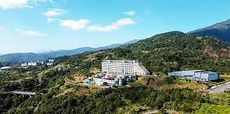
Education is mandatory until the age of 16 for children living in Huachang, which is also the minimum age at the federal level. Huachang's towns and cities feature many schools, from elementary to high school. As well as this, Huachang is home to many small colleges and the Xiasi campus of the University of Luhai. The state also has one university: the University of Chishang
The University of Chishang is a well regarded research university located in central Chishang and is known for its extensive research into nuclear power, as well as being home to one of only two fusion reactors in Monsilva. The university has a large capacity that has lead to Chishang commonly being referred to as a 'university town' or '大学城'.
Culture
Tourism
Huachang is home to many tourist attractions, and attracts tourists at an annual rate averaging between 2 to 3 million people. The majority of tourists in Huachang are not staying in the state, and are instead visiting from nearby Amking to see Huachang's national parks.
One of Huachang's most famous attractions is the Lienko National Park, which is Huachang's most popular national park and is situated in the north west of the state. It is well known for its gorges and thin valleys, as well as the good views from atop the mountains.
Sport
Association football is the most popular sport in Huachang, followed by yuchio and basketball. Huachang is home to two professional football teams, Chishang Laohu F.C. and the Suao Dragons. Chishang Laohu is currently in the Monsilvan Super League.
Yuchio was extremely popular in the early 20th century in Huachang, which has lead to many yuchio courts being built across the state. However, its popularity has declined significantly since then, which has lead to a lot of these courts being abandoned. However, the Huachang State Government have a scheme to recover these abandoned courts to either re-open them or refurbish them into homes or businesses. This has also created a phenomenon of people wanting to live in refurbished yuchio courts.
Like most states in southern Monsilva, basketball is a popular sport in Huachang. The state is home to the Chishang Mountains Basketball Team, which is a very successful basketball team that has won the Monsilvan Super Basketball League four times.

